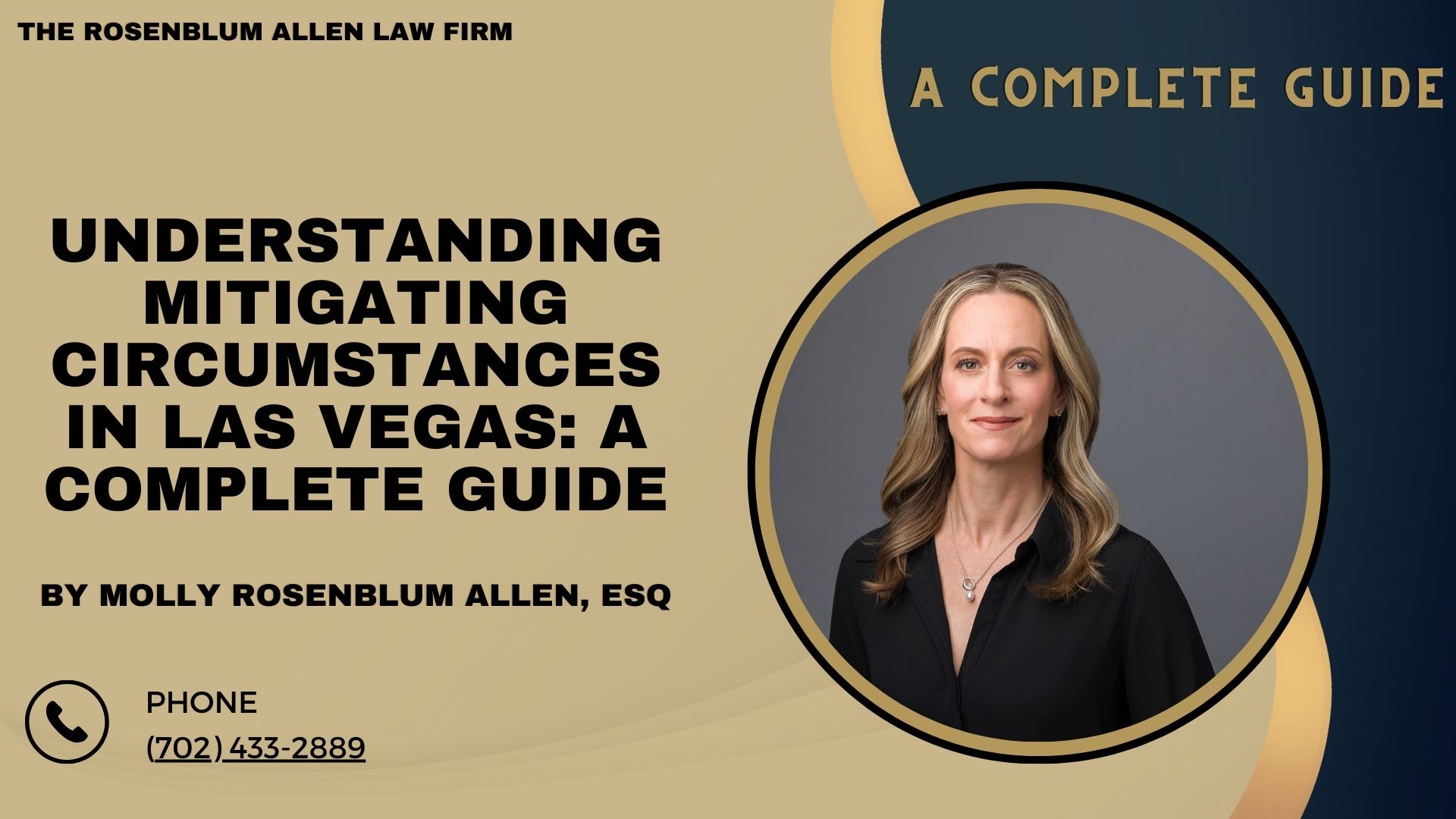Have you ever wondered why two people get very different sentences? They committed similar crimes. The answer often lies in the concept of “mitigating circumstances.” This guide will dive deep into mitigating circumstances. It will explain why they’re crucial in the Las Vegas legal system. It will also explain how they could affect a criminal case’s outcome.
Mitigating circumstances can turn the tide in sentencing. They offer a glimmer of understanding in the black-and-white law. They remind us that there’s a story, a person, and often, a reason for hope behind every case.
 Overview of Mitigating Circumstances
Overview of Mitigating Circumstances
Legal Definition and Relevance
Mitigating circumstances are factors. They do not excuse an offense, but they reduce the punishment’s severity. In the eyes of the law, these circumstances make the offense less severe. They also make the offender less culpable. Understanding these nuances is vital for anyone navigating the Las Vegas legal system.
Types of Mitigating Circumstances
Mitigating circumstances vary. They are as varied as the stories behind them. But, they generally fall into a few broad categories:
Personal Background Factors
Childhood Trauma
Abuse or neglect in childhood can greatly impact a person’s development. It can also affect their decision-making. Courts consider these factors. They help understand the background that led to the crime.
Mental Health Issues
Mental health conditions can affect a person’s control over their actions. Recognizing these conditions can lead to sentences with treatment options. This reflects a more kind approach to justice.
Circumstances Surrounding the Offense
Lack of Premeditation
An impulsive act suggests different moral blame than a planned one. This distinction can significantly affect sentencing.
Provocation
We might view actions taken in response to provocation less harshly. This is because we acknowledge the human instinct to react under stress.
Post-Offense Behavior
Cooperation with Law Enforcement
A defendant who helps law enforcement shows a willingness to take blame. This often leads to lighter sentences.
Remorse and Rehabilitation Efforts
True regret and proactive steps can sway a judge’s view on sentencing. They show the defendant’s commitment to change.
This overview covers mitigating circumstances. It shows the complexity of the legal system. It highlights the importance of context in deciding sentences. As we delve into how these factors play out in specific cases, remember the key issue: fairness. It is about the belief in the chance of redemption.

The Role of Mitigating Circumstances in Criminal Cases
Mitigating circumstances are pivotal in the law. They matter most during a trial’s sentencing phase. They are the threads in the fabric of justice. They add nuance and compassion to what might be a rigid system.
Sentencing Phase of a Trial
How Judges Consider Mitigating Factors
Judges use mitigating factors as a lens to view the entirety of a case, not just the crime itself. They look at the individual, their past, and the circumstances leading to the offense. This approach ensures the punishment fits the crime. It also fits the person behind it.
Impact on Sentencing Decisions
The impact of mitigating circumstances on sentencing can be profound. They can lead to reduced sentences. They can also lead to other sentence options. These options include community service or rehab programs. In some cases, they lead to probation instead of jail. The goal is to balance the scales of justice. This is done by considering all factors that contribute to an offense.
Examples of Mitigating Circumstances Affecting Sentences
Case studies from Las Vegas show the real-world impact of mitigating factors. These examples involve: – A young person who made a one-time mistake and showed true remorse. – Someone who acted under extreme emotional distress. They show how the law sees people’s behavior as complex.

Mitigating Circumstances in Specific Offenses
Different crimes come with their own sets of potential mitigating factors. Understanding how they apply to specific offenses can offer insight. It can show the legal strategies used in defense.
DUI and Traffic Violations
First-time Offense
First-time offenders often get lighter sentences. This is true if they show regret and a commitment to not repeating their mistakes.
Lack of Harm to Others
If the offense did not hurt others, this can be a big mitigating factor. It leads to reduced penalties.
Drug-related Offenses
Addiction as a Mitigating Factor
Courts may see addiction as a mitigating circumstance. They recognize the need for treatment, not punishment.
Intent for Personal Use
If the drugs were for personal use, not for distribution, this could lead to a lighter sentence.
Violent Crimes
Self-defense
Claiming self-defense requires proving that the defendant believed they were in imminent danger. This can significantly mitigate the perceived severity of the offense.
Emotional Distress
We can view with compassion actions taken under extreme distress. This can lead to reduced sentences.

Legal Process and Mitigating Circumstances
Navigating the legal system with mitigating circumstances in mind is delicate. It requires expertise and understanding.
Presenting Mitigating Circumstances in Court
Role of Defense Attorneys
Defense attorneys play a crucial role in presenting mitigating circumstances effectively. They gather evidence and secure witness testimony. They craft arguments that highlight these factors to the court.
Evidence and Witness Testimony
Evidence, such as medical records or character testimony, can support mitigating circumstances. It provides a fuller picture of the defendant’s situation.
Challenges in Proving Mitigating Circumstances
Burden of Proof
The defense carries the burden of proving mitigating circumstances, which requires a thorough and compelling presentation of evidence.
Skepticism from Prosecutors and Judges
Defense teams must win over skeptical prosecutors and judges. They may see showing mitigating factors as just dodging punishment.
This guide section emphasizes the key role of mitigating circumstances. They are important in the legal process. They are especially crucial in deciding sentences. It shows the law can feel empathy. It also shows the law recognizes the complex human experience. As we continue, the guide will detail the impact of Nevada laws on mitigation. It will explain the need for skilled legal help in navigating these nuanced waters.
Why You Have Not Hired a Felony Defense Attorney Yet
Watch this short video to take the next big step toward defending your rights against a felony charge.

Breaking It All Down
We are finishing this guide to understanding mitigating circumstances in Las Vegas. The legal system is complex. But, it aims for fairness and justice. Mitigating circumstances are a crucial bridge. They connect the black-and-white letter of the law to the colorful human experience. They remind us that behind every legal case is a story. A person and many factors contribute to the situation.
Understanding and using mitigating circumstances is very important. This is especially true for those facing legal challenges in Las Vegas. These factors can change the case’s outcome. They shift the scales of justice toward fairness. They stress the need for compassion, empathy, and a deep understanding of people. These are important in the legal process.
For Las Vegas residents, whether you’re in the legal system or just seeking to learn, remember: the law is not just about punishment. It’s about justice, rehab, and providing a way for people to make amends. It’s about moving forward with their lives.
The Rosenblum Allen Law Firm is ready to guide you through these complexities. They offer experienced, caring legal help. We are committed to ensuring that we listen to your story. We will thoroughly consider your circumstances and vigorously defend your rights.
In the end, the journey through the legal system is full of challenges and nuances. But, it reinforces the belief in the chance of redemption and change. Understanding mitigating circumstances in Las Vegas is more than a legal strategy. It’s a testament to human spirit and the pursuit of justice.

More Frequently Asked Questions
What are the most common types of mitigating circumstances?
Common types include personal hardships, mental health issues, lack of prior criminal history, acts under duress or coercion, and genuine remorse shown by the defendant.
How can I prove mitigating circumstances in court?
Proving mitigating circumstances requires ample evidence, such as medical records, effective testimony, and character witnesses, supporting these factors.
Can mitigating circumstances completely erase a sentence?
While mitigating circumstances can significantly reduce a sentence, they rarely lead to its complete elimination. They mainly serve to provide the court with more context, resulting in a fairer punishment.
Do mitigating circumstances apply to all types of crimes?
Mitigating circumstances can be considered in all crimes, but their impact varies depending on the specific details of each case and the type of crime involved.
How does the court determine the relevance of mitigating circumstances?
The court evaluates the closeness of mitigating circumstances to the behavior or situation that led to the crime. Each case is individually assessed to determine which factors are relevant.
Are there any risks associated with presenting mitigating circumstances?
Presenting mitigating circumstances requires a delicate balance to show the defendant’s full situation without revealing information that could be detrimental. A strategic approach and assistance from a skilled defense attorney are often necessary.
Can the prosecution challenge the mitigating circumstances presented?
Yes, the prosecution can challenge the mitigating circumstances presented by the defense by offering evidence or arguments to diminish their impact on the defendant’s behavior.
How do mitigating circumstances influence plea bargains?
Mitigating circumstances can significantly influence plea bargain negotiations, potentially resulting in better terms such as reduced charges or lighter sentences.
Is there a disparity in how federal and state courts handle mitigating circumstances?
Federal and state courts may have differing approaches to handling mitigating circumstances due to distinct guidelines. Understanding the applicable legal framework specific to the case is crucial.
Can mitigating circumstances be introduced after a sentence has been imposed?
In some instances, mitigating circumstances can be introduced during an appeal or a request to amend a sentence. However, this process can be challenging and offers limited opportunities.

Glossary
Mitigating Circumstances: Factors that, while not excusing a criminal act, can reduce the severity of the punishment by providing context that makes the offender less culpable.
Sentencing Phase: The stage in a criminal trial where the judge determines the appropriate punishment for the convicted individual, considering various factors, including mitigating circumstances.
Burden of Proof: The obligation to prove one’s assertion or claim. In the context of mitigating circumstances, it often falls on the defense to prove that these factors should influence the sentencing.
Probation: A sentencing alternative to imprisonment where the offender remains under supervision in the community, often subject to certain conditions for a specified period.
Rehabilitation Efforts: Actions an offender takes to improve their behavior and reintegrate into society, often considered by courts as mitigating circumstances.
Cooperation with Law Enforcement: When an offender assists law enforcement in their investigation or provides essential information related to their case or other crimes, which can be viewed as a mitigating factor.
Remorse: A feeling of regret or guilt for having committed an offense. Demonstrating genuine remorse can be a significant mitigating circumstance in sentencing decisions.
Addiction: A medical condition that can impact an individual’s control over their use of substances. Courts may consider addiction as a mitigating factor, especially in drug-related offenses.
Self-defense: Defending oneself or others from immediate harm, which can be considered a mitigating circumstance in cases involving violent crimes.
Emotional Distress: Psychological suffering that can impact an individual’s decision-making and behavior. Actions taken under extreme emotional distress may be viewed as less guilty.
First-time Offense: When an individual has no prior criminal record or convictions. Being a first-time offender can be a mitigating factor, leading to more lenient sentencing.
Legal Representation: The assistance of a lawyer or attorney in legal matters. Effective legal representation is crucial in presenting mitigating circumstances effectively in court.
Plea Bargain: An agreement between the defendant and prosecutor where the defendant agrees to plead guilty to a lesser charge or one of multiple charges in exchange for a lighter sentence or other benefits.
Sentencing Guidelines: A set of rules used by judges to determine the appropriate sentence for a convicted individual, which may allow for adjustments based on mitigating or aggravating circumstances.

Additional Resources for You
In addition to this comprehensive guide on mitigating circumstances, our lead attorney, Molly Rosenblum Allen, Esq., has also created a wealth of resources to assist you during your time of need. These resources cover a wide range of topics that are crucial for anyone navigating the legal system or seeking to understand their rights and options. Below, you’ll find a selection of these resources, each designed to provide you with in-depth information and guidance:
Double Jeopardy: Explore the protections against being tried for the same crime twice. Learn more.
Hung Jury: Understand what happens when a jury cannot reach a unanimous verdict. Learn more.
Circumstantial Evidence: Discover the role and impact of circumstantial evidence in legal proceedings. Learn more.
Indicted vs Charged: Clarify the differences between being indicted and being charged with a crime. Learn more.
Difference Between Jail and Prison: Get insights into the distinctions between jail and prison. Learn more.
What are Miranda Rights: Understand the importance of Miranda rights and how they protect you during police interactions. Learn more.
How to Check if You Have an Outstanding Warrant: Find out the steps to take if you suspect there’s an outstanding warrant against you. Learn more.
What to Look for in a Criminal Defense Lawyer: Learn what qualities and credentials are important when selecting a defense attorney. Learn more.
Possible Ways to Reduce a Felony Charge: Discover strategies that might reduce the severity of a felony charge. Learn more.
Should You Accept a Plea Bargain: Consider the pros and cons of accepting a plea bargain in your case. Learn more.
These resources, crafted with expertise and care, are here to empower you with knowledge and help you make informed decisions about your legal journey. Whether you’re facing charges, seeking to understand specific legal concepts, or simply wish to be better informed, the Rosenblum Allen Law Firm is your trusted partner in navigating the complexities of the legal system.

Outside Resources for You
American Bar Association (ABA): A premier resource for legal professionals and the public, offering a wealth of information on various legal topics. Visit ABA
FindLaw: A comprehensive resource for legal information, providing easy-to-understand explanations of laws across all states and legal topics. Explore FindLaw
Justia: Offers a vast repository of legal information, including case law, statutes, and legal guides to help the public understand their rights and legal procedures. Check out Justia
National Association of Criminal Defense Lawyers (NACDL): An organization dedicated to ensuring justice and due process for persons accused of crimes. Visit NACDL
Avvo: Provides access to legal advice, a directory of lawyers across the United States, and a Q&A forum where users can ask legal questions. Explore Avvo
NOLO: Offers a wide range of free legal articles, DIY forms, and an extensive legal dictionary. NOLO aims to make the law accessible to everyone. Visit NOLO

A Special Message from Our Lead Attorney, Molly Rosenblum Allen, Esq

Dear Reader,
Thank you for exploring our resources. They cover mitigating circumstances in Las Vegas and other key legal topics. We hope you found the information insightful. It should empower you as you navigate the complexities of the legal landscape.
At The Rosenblum Allen Law Firm, we know each case is unique. It is as unique as the people involved. We are committed to providing personalized, compassionate legal representation. This commitment is at the core of everything we do. You might be facing a legal challenge. Or, you might need advice on a specific matter. Or, you might have questions about the legal process. We’re here to help.
Please take the next step in getting the support and guidance you deserve. You can do this by scheduling a free consultation with our team. Please call us at (702) 433-2889 to arrange a time that works for you. This consultation is a chance for us to learn about your situation. We will discuss how we can help you achieve the best outcome.
Thank you once again for your trust in us as your legal resource. We look forward to the opportunity to serve you.
Warmest regards,
Molly Rosenblum Allen, Esq.




